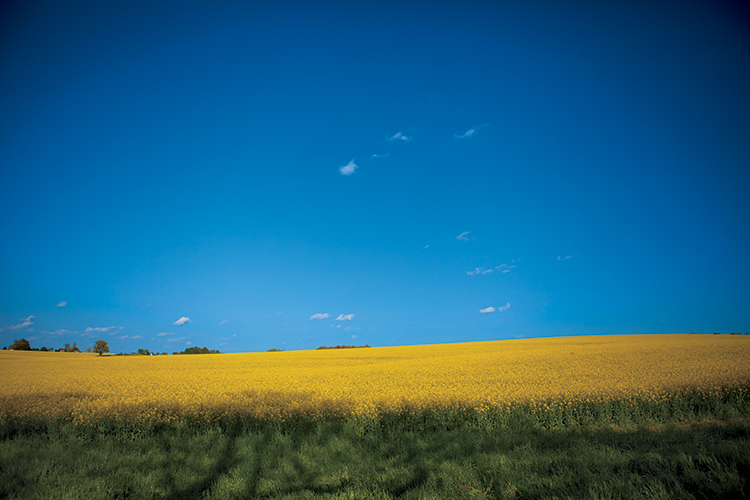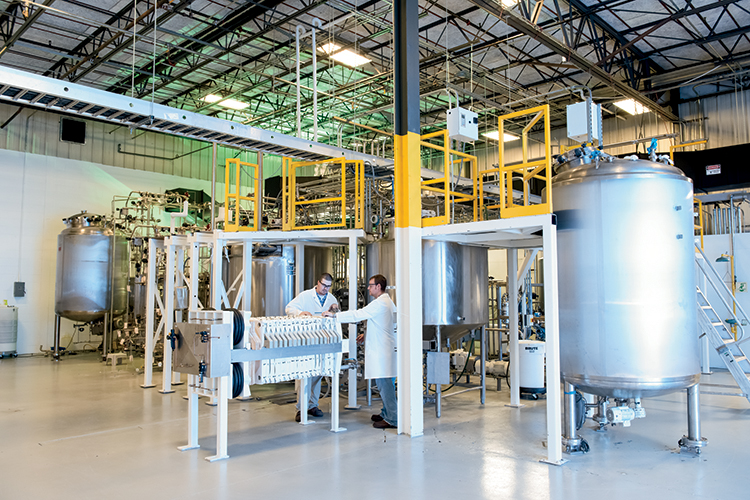Home > Georgia > Georgia Crops & Livestock > Georgia Canola Fields of Gold
Georgia Canola Fields of Gold

The canola oil a restaurant cooked with today could become the plastic fork you eat with tomorrow.
“Growing canola in south Georgia is good for the community, good for the region, good for the state and good for the country,” says Michael Smith, chief operating officer for Meredian Holdings Group. “When used in biopolymers, it is helping to make the U.S. less dependent on foreign oil.”
Meredian Group developed technology that could revolutionize the plastics industry by turning canola into cups, bottles and packaging that are biodegradable in 60 to 90 days.
The Bainbridge-based group is a collection of three companies, each with a specific role in creating the biopolymer: Meredian Inc. commercializes biopolymer technology sold by Proctor & Gamble; Danimer Scientific LLC makes biopolymers; and AgroCrush LLC purchases canola seed to crush into oil used in the biopolymer production process, as well as for outside customers who cook with canola oil, Smith says.
“This new technology included a way to make polyhydroxyalkanoates [or PHAs], a completely biodegradable polymer made when bacteria eat vegetable oil such as canola,” Smith says. “The bacteria that produce the PHA can do so with virgin oil or used oil.”
The road map that turns canola into biodegradable plastics starts out with a non-genetically modified canola seed, Smith says.
Once the canola is harvested, the seeds go through a cold press process to extract pure canola oil. The canola oil is placed in a bio-reactor alongside naturally occurring microorganisms, water and oxygen. It’s in this fermentation environment that bacteria convert the oil into PHAs.
PHA powder results from separation, purification and drying. These are then turned into pellets through a process known as reactive extrusion, and shipped to major brand partners to create plastic utensils, packaging, inks and more.
Opportunities for Farmers
Greg Calhoun of Brinson, one of the farmers providing Meredian with the canola seed needed to begin this process, is full of praise about the company, its job-creation potential and support of the farming community. He learned about the technology in 2007 and realized that by using a renewable resource – canola – to create a biodegradable plastic, the end products could be produced at a competitive price.
“I invested in Meredian, got a seat on the board, and we were Meredian Inc., manufactures bioplastics from renewable, natural resources at its Bainbridge plant. talking about the seed stock and how it had to be brought in from another state,” Calhoun says. “I mentioned that I had grown canola 15 years earlier. Meredian bought the rights to a non-GMO seed, I grew about 350 acres of it on my farm this past season, and two other farmers also grew seed on their farm.”
Canola fit well on Calhoun’s PGC Farms, which he expanded from 108 acres into thousands that cultivate peanuts, wheat, cotton, soybeans, sweet corn and cattle. The entrepreneurial farmer also heads up operations for shelling peanuts, ginning cotton and distributing sweet corn throughout the U.S.
Even though it was a tough growing season, Calhoun says the canola crop is a stronger financial producer than the winter wheat he would have planted in its place. “This is a viable winter crop for southwest Georgia,” Calhoun says.




